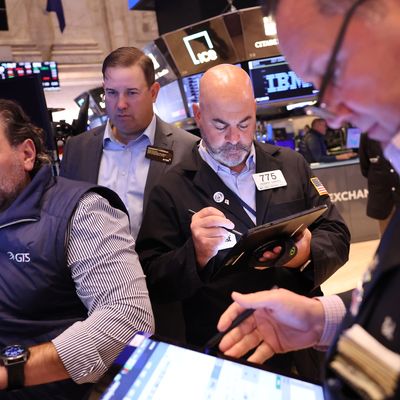
With more than 24 hours to go before the last votes are counted on Election Day, Wall Street’s already booking its own wins.
In the final days of this election — which has been, for the first time in a century, refracted through the lens of high-volume betting markets — the finance industry is acting more like risk-averse investors and less like they’re on the floor of the Trump Taj Mahal. By Monday, odds for both Donald Trump and Kamala Harris across betting sites had more or less converged, following a handful of strong polls and voter-turnout results that favor Democrats. Accordingly, some so-called Trump trades have faded too with bets on private prisons, bitcoin, and U.S. stocks going sideways.
There is no one single reason why the markets have become more anxious and noncommittal about the election on Monday. Some of it is, surely, an industrywide hedging of bets that will insulate investors from Tuesday’s outcome, whatever it may be. But to traders and hedge-fund managers, the election is simply one event in a long line of things to worry about. “Most of us are investing for years and decades, not days. We should be meticulously watching the economy, not reacting to headlines,” Callie Cox, chief market strategist at Ritholtz Wealth Management, wrote in a research note Monday.
There are a handful of Trump trades that have deflated over the past week or so. GEO Group, the private-prison company that surged after Trump’s 2016 win, is down 15 percent. The Dow Jones fell more than 200 points on Monday. Bitcoin is more than $5,000 off of its recent $73,000 peak. Even U.S. Treasury bonds, which have been massively shorted in expectation of an inflationary Trump economy, have rallied a bit from last week’s sell-off. Trump Media & Technology Group, the ex-president’s meme-stock company, has lost more than a third of its value. Betting odds across the board give only a slight edge to Trump — roughly 55 to 45, as of Monday afternoon.
It was only a few days ago that the moneyed set seemed confident that Donald Trump would run away with the election, ushering in a second anti-tax, pro-tariff, general pro-business Trump economy, this time aided by a predicted Republican-dominated Congress and Supreme Court. What happened? On some level, it looks like political prognostication reflected less an actual belief in who would be in the White House than a short-term strategy for making money off the belief that Trump would win.
Consider the view from Goldman Sachs. For most of October, just about everything — stocks, gold, oil, bitcoin — were on a historic run. By Friday, though, the bank was telling clients that it might be time to exercise some caution. “Our overarching bias is that post-election moves are more likely to present opportunities to eventually fade (rather than something to chase),” the bank’s economists wrote in a note on bonds and interest rates. Translation: Well, that was fun, but now it’s time to sell.
To investors, there is a full calendar to consider. On Thursday, the Federal Reserve will likely cut interest rates again, as well as give some hint of how healthy the economy is. Bond investors are probably more worried about a debt ceiling standoff that could cause a fresh round of gridlock in Washington. “Of course, policy changes can lead to different outcomes, and elections are harbingers of policy change,” Cox said in her note. “But frankly, the Oval Office doesn’t wield as much power over the economy as individuals, businesses, and the Fed.”






























